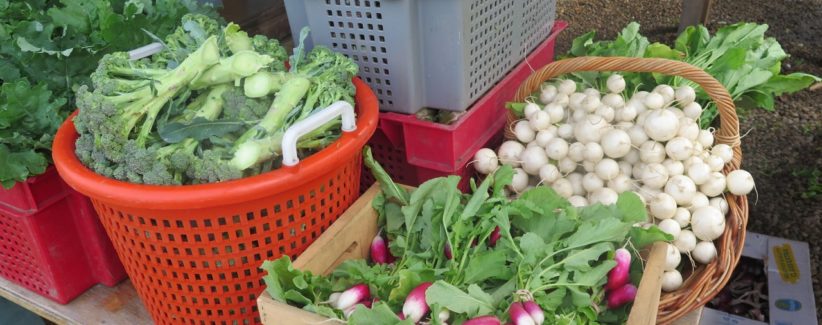Topping the Scales

Between April and December 2018, we donated a record 99,000 pounds of organic produce to our twelve hunger-relief partner organizations. By gradually improving our soil, infrastructure, and farming practices with investments in irrigation, fencing, personnel, and shelters, we have raised production almost 300 percent—up from 34,000 pounds in 2013. This is a wonderful by-product of increasing the quality of produce for our recipients and the quality of farm experiences for our staff and 2,500 volunteers.
The increase in quality and quantity of fresh organic produce donated to metro Boston communities is now being recognized as more than just calories. Greater Boston Food Bank (GBFB) estimates that food insecurity and hunger in Massachusetts lead to $2.4 billion in health-related spending—costs that could be avoided.* In our 2018 panel, “Hunger Relief from the Ground Up,” Dr. Kathryn Brodowski of GBFB spoke about newly funded programs that connect the food insecure with more fresh, healthy food to bridge the gap between hunger and health.
Harvard Law School’s Center for Health Law and Policy Innovation has been developing a Food is Medicine State Plan to map the needs and develop a strategy to increase the availability of interventions throughout the state. Providing healthy food for those who are malnourished or food insecure can prevent the need for more expensive treatments for illness. Overlaying maps of food insecurity, chronic disease and vehicle access reveal that Boston and Lowell are two of the 26 highest-priority towns. Gaining Ground donates organic produce to five hunger-relief organizations in these communities (Pine Street Inn, Rosie’s Place, Lowell Transitional Living Center, House of Hope, plus two Head Start sites) as well as seven other organizations in communities with enormous need and appreciation.
Without steady supporters and numerous volunteers, inspired by a dedicated farm staff, Gaining Ground could not provide this growing supply of fresh produce that addresses the hunger and health needs of food insecure families in our communities.
“Your farmer’s market at Head Start provides more accessibility to healthy options, and children have fun making the healthy choices. Families have learned how to use different vegetables in their meals and get excited to try new things.”—Head Start Director, Lowell